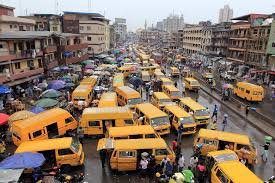According to Dr. John Okesoto, a Lecturer at the Yaba College of Technology, the average Lagos resident spends approximately 57% of their working hours commuting to their workplace, while 27% of their salary is allocated towards transportation expenses.
Dr. Okesoto, from the Department of Regional and Urban Planning, made these observations while delivering the 15th Inaugural Lecture Series 2024, titled “Lagos: The Poor, the Pot and the Bed.”
Okesoto attributed this situation to the fact that most workers have been displaced from Central Lagos, where the majority of the businesses they are employed by are located. In explaining the lecture’s title, he noted that “the poor” represents the worker, “the pot” refers to the workplace, and “the bed” signifies the worker’s place of residence.
Okesoto explained that low-income earners have gradually been displaced from the inner city areas, while the wealthy have resided closer to the city center, and the poor have been dispersed to the outskirts. This has resulted in the poor spending more money to commute to the city center to earn a living, which violates the principles of sustainable development. Okesoto emphasized the need to address the housing-job relationship.
Interestingly, Okesoto observed that in the pre-colonial era, the poor lived in the inner city, and the rich resided in the outskirts, a reversal of the current situation.
The advent of colonialism led to the continuation of segregation even in the post-colonial era, with the development of Government Reserved Areas (GRAs). Okesoto highlighted the predicament faced by the low-income working class in deciding where to live within the city of Lagos, particularly in the inner cities, which comprise Ikoyi, Obalende, Lekki, and Victoria Island.
The purpose of the lecture is to clarify the housing inclusion of the working poor, exploring the advantages of doing so and providing a course into the future housing location choice of the working poor. This aims to ensure that the low-income earners live close to their workplaces, often referred to as the inner city.
The low-income working class in the city of Lagos is limited in the choice of where to live due to economic reasons. They are unable to participate effectively in the housing market in the inner city of central Lagos, where their workplaces exist, as the market is mostly composed of luxurious housing units that cost 40% more than what is obtained in other parts of the city. Those who effectively participate in this market are individuals whose mean income is significantly higher than that of the low-income workers.
The inner city housing market demonstrates exclusionary practices toward low-income workers. This population is consequently confined to the suburbs, necessitating lengthy commutes to access their places of employment. The exorbitant costs associated with such daily commutes further exacerbate the challenges faced by this demographic. This situation suggests that the inner city housing market is inherently inaccessible to low-income individuals.


































